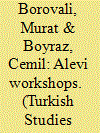| Srl | Item |
| 1 |
ID:
139251


|
|
|
|
|
| Summary/Abstract |
This paper aims to analyze the Alevi Opening in 2009 by the Justice and Development Party. Based on a close reading of the manuscripts of the seven workshops and the subsequently published report, a critical analysis of the initiative by the government is presented. It is argued that the organization and the composition of the workshops were not conducive to attaining a set of solutions to the problems encountered by the Alevis. The article concludes by stating that, though a historic step in state–Alevi relations, the Opening has not been successful in producing a politically significant result.
|
|
|
|
|
|
|
|
|
|
|
|
|
|
|
|
| 2 |
ID:
139252


|
|
|
|
|
| Summary/Abstract |
The Society for the Dissemination of Free Ideas (SDFI) was the first liberal civil society organization in Turkey. To this date, little attention has been paid to its actions and ideology. Taking the history of the SDFI as its central focus, this article aims to give an account of liberal opposition to authoritarianism in Turkey in the late 1940s, analyzing the factors which led self-proclaimed liberals to unify and eventually disband their alliance, and the novelties and limits of liberal thought at the time.
|
|
|
|
|
|
|
|
|
|
|
|
|
|
|
|
| 3 |
ID:
139256


|
|
|
|
|
| Summary/Abstract |
Despite major differences among political systems, one can conduct new research on pledge fulfillment by examining previously ignored cases. Accordingly, this article extends the literature by developing a new analysis for the Turkish context. The main contribution of this paper is the introduction of explicit models, which evaluate political pledges and their fulfillment by using an original data set. In particular, this study reveals the following facts: (a) in a comparative perspective, pledge fulfillment is low in Turkey and (b) its governmental forms and economic performance have an impact on pledge fulfillment.
|
|
|
|
|
|
|
|
|
|
|
|
|
|
|
|